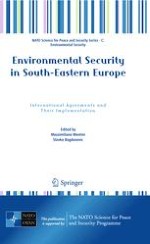Authored by international experts from academia, international organizations, governments and NGOs, this book highlights the main environmental security issues in the South-East European (SEE) countries, with a particular focus on climate change and water management. The common goal of the authors was to provide a reliable evaluation of whether existing legal regimes and correct implementation of applicable international treaties may contribute to reducing environmental security risks in the region. In-depth analyses and assessment of major challenges in compliance, serve as a firm ground which such evaluation is based on. This volume is recommended for public officials, legal practitioners and consultants. Its interest may also extend beyond the SEE countries, serving as a case-study of a broader and paradigmatic relevance of the analysis and management of environmental and security issues in a trans-boundary context.
